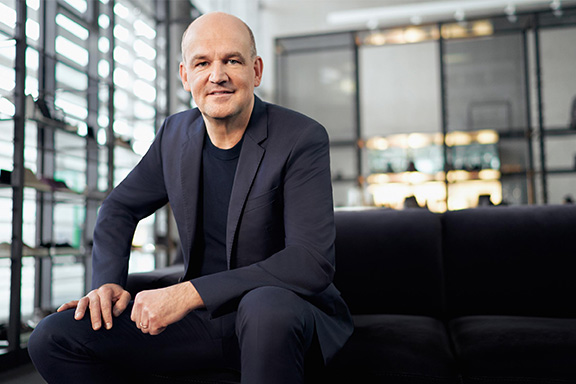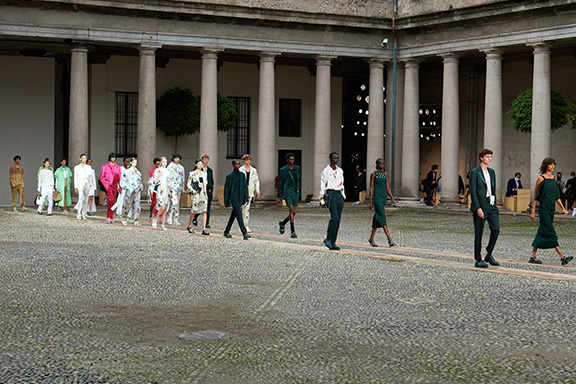Group management
- Sustainable increase in enterprise value as the guiding principle of HUGO BOSS
- Sales and EBIT the most important key performance indicators for maximizing free cash flow over the long term
- Group planning, reporting and investment controlling form core elements of Group management
Key performance indicators
HUGO BOSS aims at sustainably increasing the enterprise value. The Group’s internal management system is intended to support the Managing Board and the managers of the respective business units in focusing all business processes on this objective. In order to increase its enterprise value, the Group focuses on maximizing free cash flow over the long term. Consistently generating positive free cash flow is expected to safeguard the independence and liquidity of HUGO BOSS at all times.
Increasing sales and operating income (EBIT) is instrumental for improving free cash flow. In addition, strict management of trade net working capital and a value-oriented capital expenditure approach support the development of free cash flow. HUGO BOSS has therefore identified a total of four key performance indicators for increasing free cash flow: sales, EBIT, trade net working capital and capital expenditure.
In 2020, the negative implications of the COVID-19 pandemic led to a significant decline in sales, EBIT and free cash flow. In order to return to growth as quickly as possible, HUGO BOSS is focusing on the consistent implementation of three strategic priorities: increasing the desirability of its two brands, BOSS and HUGO, consistently exploiting global growth opportunities, and ensuring efficiency and maximum flexibility of its operational processes. Group Strategy
HUGO BOSS aims at sustainably increasing its profitability and therefore attaches particular importance to profitable sales growth. All initiatives aimed at increasing sales will therefore also be measured by their potential to generate a sustainable increase in EBIT and EBIT margin (ratio of EBIT to sales).
In order to increase the EBIT margin in the medium term, the Company is focusing on sustainably improving the gross profit and on making more efficient use of operating expenses, especially in the area of selling and distribution expenses. The main objective of the latter is to improve the profitability of the Group’s own retail business and further optimize the organizational structure.
For HUGO BOSS, trade net working capital is the most important performance indicator for managing the efficient deployment of capital.
Management of inventories as well as trade receivables is the main responsibility of the Group’s subsidiaries and the respective operating central departments. The latter are also responsible for managing trade payables. These three balance sheet items are primarily managed by reference to the days of inventories outstanding, days of sales outstanding and days of payables outstanding. Besides this, there is a specific approval process for the purchase of inventories for the Group’s own retail business in order to optimize inventories. This process takes into account sales quotas as well as expected sales growth and markdown levels.
The management of HUGO BOSS is jointly responsible for profitable growth. As a result, the short-term incentive program (STI) of managers at all four management levels is linked to the achievement of sales- and EBIT-targets. The ratio of trade net working capital to sales is the third component of the STI program. The compensation scheme for management at the two levels below the Managing Board also includes a long-term incentive program (LTI) whose design matches that for the Managing Board. Compensation Report, Performance-related (Variable) Compensation Components
Investment activity is mainly focused on the renovation and modernization of existing retail locations, selective openings of new own retail stores and the expansion of the IT infrastructure as part of the further digitization of the business model. A specific approval process exists for material investment projects. Apart from qualitative analyses, e.g., with respect to potential store locations, this also includes an analysis of each project’s present capital value. Financial Position, Capital Expenditure
Against the backdrop of the negative implications of the pandemic on sales, EBIT and free cash flow, HUGO BOSS suspended its dividend payment for fiscal year 2019, with the exception of the legal minimum dividend of EUR 0.04 per share. Also for fiscal year 2020, and in light of the persisting high uncertainty with regard to the pandemic, the Managing Board and Supervisory Board of HUGO BOSS intend to propose to the Annual Shareholders’ Meeting to only pay the legal minimum dividend of EUR 0.04 per share. In doing so, the Company aims at further strengthening its internal financing capability. Nevertheless, HUGO BOSS remains confident that it will continue to generate significantly positive free cash flow in the future on the basis of a general recovery of its business and due to its highly free cash flow generating business model. This, in turn, should enable the Group to return to its profit-based dividend policy which aims to allow the shareholders to participate appropriately in the Group’s earnings development. The free cash flow generated by HUGO BOSS is therefore intended to be primarily used to fund the dividend distribution in the years to come. Any liquidity available over and above this is used to further decrease financial liabilities or is retained as a cash reserve. The Group analyzes its balance sheet structure at least once a year to determine its efficiency and ability to support future growth, and to simultaneously provide sufficient security in the event that economic performance falls short of expectations. Financial Position, Capital Structure and Financing
Core elements of the Group’s internal management system
The Group’s planning, management and monitoring activities focus on optimizing the key performance indicators described above. The core elements of the Group’s internal management system are Group planning, Group-wide, IT-enabled financial reporting and investment controlling.
Group planning at HUGO BOSS generally refers to a rolling three-year period and is prepared as part of the annual, Group-wide budget process, taking into account the current business situation and the medium-term goals of HUGO BOSS. Based on targets set by the Managing Board, the Group subsidiaries prepare comprehensive earnings and investment budgets for their respective markets or divisions. A similar planning model is used for trade net working capital. Building on this, the development and sourcing units derive mid-term capacity planning. Thereupon, Group controlling checks all of these plans for plausibility and aggregates them to form the overall Group planning. The latter is updated at regular intervals taking into account the actual business performance as well as any opportunities and risks.
Additionally, HUGO BOSS regularly conducts liquidity assessments, based on the expected development of future cash flows. The aim is to identify financial risks at an early stage and to take appropriate measures concerning financing and investment requirements. Financial Position
On a monthly basis, the Managing Board and management of Group subsidiaries are informed about the development of business operations through standardized, IT-enabled reports, which are supplemented by ad hoc analyses. Actual data compiled by the Group-wide, IT-based reporting system is compared against budget data each month. Accordingly, any deviations are explained and planned countermeasures are presented. Developments with a significant impact on the Group’s net assets, financial position and results of operations are reported to the Managing Board without delay.
The Company is particularly focused on monitoring early indicators suitable for obtaining an indication of future business performance. In this context, sales development in the Group’s own retail business, wholesale order intake and the performance of the replenishment business are analyzed at least on a weekly basis. In addition, at regular intervals, the Company is benchmarking itself against relevant competitors. The continuous monitoring of early indicators is intended to enable the Group to identify possible deviations from its budget at an early stage and take appropriate countermeasures.
The Group investment controlling appraises planned investment projects in terms of their contribution to the Company’s overall profitability targets. This ensures that projects are only launched in case of an expected positive contribution to enhancing the Group’s economic profile. Subsequent analyses are also conducted at regular intervals to verify the profitability of projects that have already been realized. Appropriate countermeasures are taken in the event of any negative deviations from the profitability targets originally set.
In 2020, due to the high degree of uncertainty related to the COVID-19 pandemic and its impact on the business of HUGO BOSS, a very close dialogue took place between the Managing Board, Group controlling as well as the management of the central departments and the Group subsidiaries. In light of the dynamic evolution of the pandemic, corporate planning was regularly reviewed and updated during the course of the year. In this context, various developments of the pandemic and their potential effects on the Group’s key performance indicators were simulated with the help of scenario analyses.
HUGO BOSS has put particular emphasis on cash flow development in 2020. As a result, at an early stage of the pandemic, the Company has initiated and successfully executed comprehensive measures with a total volume of at least EUR 600 million aimed at securing cash flow. In particular, the Company significantly reduced its operating expenses, postponed non-business-critical investments, significantly reduced the merchandise inflow and suspended the dividend payment for fiscal year 2019, with the exception of the legal minimum dividend of EUR 0.04 per share. As a result, HUGO BOSS has successfully maintained its financial stability and flexibility at all times during the pandemic. Comparison of Actual and Forecast Business Performance


